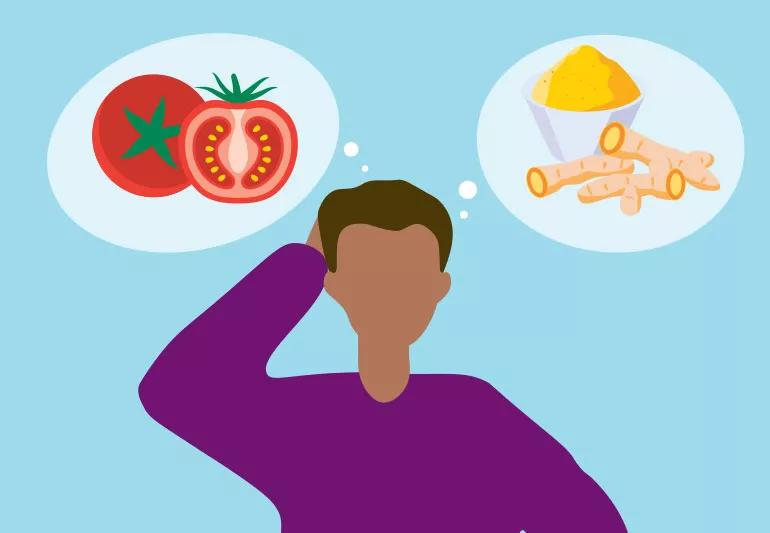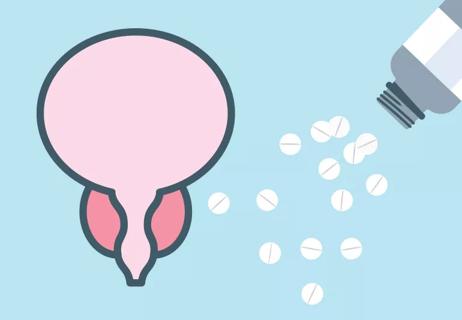Foods that can help, and harm, your prostate

When we talk about having a healthy, balanced diet, we often think about weight control, general fitness or keeping cholesterol down. It’s less common to choose certain foods with the aim of cancer prevention.
Advertisement
Cleveland Clinic is a non-profit academic medical center. Advertising on our site helps support our mission. We do not endorse non-Cleveland Clinic products or services. Policy
But some studies suggest it might be worth keeping in mind, particularly when it comes to preventing prostate cancer.
According to urological surgeon Brad Gill, MD, MS, while nutritional studies can be informative, the data is much harder to prove than other types of scientific or medical studies, as there are a number of factors that can impact results.
Still, there’s no downside to a good, healthy diet, and if some studies are correct, some of the foods you eat may have a positive impact on helping prevent prostate cancer. We talked to Dr. Gill about which of these healthier diet options you should consider.
Tomato and tomato products contain an antioxidant called lycopene. Some studies have shown that lycopene could potentially lower the risk of developing prostate cancer.
Tumeric is linked to several benefits that include anti-inflammatory properties, an element that could be key in suppressing the development of prostate cancer. “Tumeric and other anti-inflammatory foods could reduce the levels of prostate-specific antigens (PSA),” says Dr. Gill.
A prostate-specific antigen is a protein produced by both healthy and unhealthy cells in your prostate, and a PSA blood level is a common test used to screen for prostate cancer. Rapid rises in levels of PSA are often a sign of the development of prostate cancer or other prostate inflammation. Slower increases in PSA over years may indicate prostate growth, which is normal.
Advertisement
Just as with foods that might help you prevent prostate cancer, Dr. Gill says that information about what foods to avoid is also a bit uncertain.
“The biggest challenge with studying the impact of diet on medical conditions, like prostate cancer, is that things often happen at a glacial speed, very slowly compared to studying other things, like the impact of a medication on blood pressure,” he says. “If you wanted to see the effects of diet on prostate cancer development, you’d really need to follow subjects for at least 15 to 20 years, if not longer.”
Still, there’s evidence that points to certain foods being bad news. “What we do know about avoiding prostate cancer is similar to avoiding colorectal cancer and heart disease,” he adds. Those dietary risks include:
Prostate enlargement is another issue that can be worsened by a poor diet, with links to inflammation and diabetes. Studies suggest that a diet heavy in processed food, sugars and big carbohydrate loads may lead to inflammation and worsen prostate enlargement, Dr. Gill notes.
Regardless of your diet — but, really, keep it healthy! — the best thing you can do is be aware of your personal risk factors for prostate conditions and consult with your doctor on how to monitor or address these. Some of the risk factors for prostate cancer include:
Besides regular exercise and a healthy diet, be sure to talk to your doctor about regular prostate screenings. Early detection is key, so keep these risk factors and potential symptoms in mind and consult your doctor regularly to put yourself in the best position for early detection.
Screening for prostate cancer is simple and only involves an office visit, physical exam and blood test. And it’s a condition that, if detected on routine screening, can often be treated and cured.
Advertisement

Sign up for our Health Essentials emails for expert guidance on nutrition, fitness, sleep, skin care and more.
Learn more about our editorial process.
Advertisement

Trouble peeing and leaking urine are common indicators of prostate gland issues

A prostate massage is used most often for sexual stimulation

Research raises doubts about the effectiveness of supplements for your prostate

Keto can reduce blood sugar, but that doesn’t mean it’s right for everyone

Cravings are a natural response to hormonal changes, but giving into them may make you feel worse

People with PKU need to avoid high-protein foods, like meat, dairy, legumes and whole grains

Olive oil is high in heart-friendly unsaturated fats

The tropical fruit is a good source of antioxidants and vitamin C

Even small moments of time outdoors can help reduce stress, boost mood and restore a sense of calm

A correct prescription helps your eyes see clearly — but as natural changes occur, you may need stronger or different eyeglasses

Both are medical emergencies, but they are very distinct events with different causes